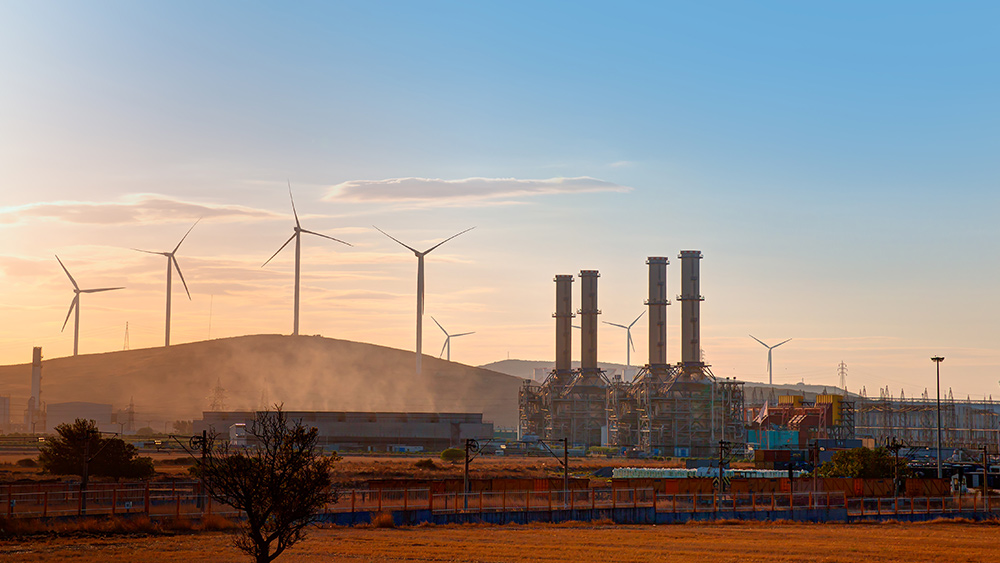Green energy failure: UK spends over £1 billion this year to turn off wind farms and start up gas plants
12/10/2024 / By Cassie B.

- UK Wind Energy Costs: The UK has spent over £1 billion this year to turn off wind farms and start gas plants, highlighting the financial burden of renewable energy integration.
- Grid Infrastructure Mismatch: Despite a 50% increase in offshore wind capacity in the past five years, grid infrastructure has not kept pace, leading to grid overload and wind farm shutdowns.
- Outdated Energy System Rules: The UK’s energy system rules are outdated, forcing operators to shut down wind farms and start gas plants, undermining decarbonization goals and increasing energy bills.
- Political and Environmental Concerns: The return of President-elect Donald Trump could jeopardize the UK’s ambitious decarbonization plans, raising questions about the future of wind energy investments.
- Cautionary Tale for Policymakers: The UK’s experience serves as a warning to other countries about the dangers of hasty green policies without proper infrastructure and planning.
In the race to embrace renewable energy, the UK has found itself in a costly predicament. Wind energy, once hailed as the silver bullet for our energy woes, is now proving to be a significant financial burden. The UK has spent more than £1 billion this year alone to turn off wind farms and start up gas plants in a stark reminder that hasty decisions without proper planning can lead to disastrous consequences.
It’s not surprising that wind energy is failing to live up to its promises. Governments, driven by the fervor of achieving net-zero targets, have blindly pushed for alternative energy without fully considering the drawbacks. The UK’s energy grid, designed for a different era, is struggling to cope with the surge in wind power. The result? A record amount of wind power is being wasted, and consumers are footing the bill.
The UK has boosted its offshore wind fleet by 50% in the past five years and plans to double it over the next five years. However, the grid infrastructure has not expanded at the same pace. This mismatch has led to the operator paying wind farms to turn off, particularly those in Scotland, to prevent grid overload. The irony is palpable: while the UK pays Scottish wind farms to shut down during windy conditions, it simultaneously pays for gas-powered plants in the south to fire up. This absurd scenario highlights the flawed logic of rushing into renewable energy without considering the big picture.
The problem is exacerbated by the UK’s energy system rules, which are outdated and ill-equipped to handle the complexities of balancing supply and demand in real time. To keep the lights on, the operator is forced to shut down far-flung wind farms and start up gas-fed plants closer to demand centers. This not only undermines their misguided decarbonization goals but also increases energy bills, making it harder for consumers to benefit from the touted advantages of renewable energy.
Clem Cowton, director of external affairs at Octopus Energy Group, rightly criticizes the “outdated rules” of the energy system. However, the blame should not be solely on the rules but also the lack of foresight and planning. The mad rush to achieve net-zero targets has resulted in bad planning, with little to no consideration for the practicalities of integrating large-scale wind energy into the existing grid.
A cautionary tale
This situation should serve as a cautionary tale for other countries considering similar energy transitions. Wind power, like electric vehicles, is often portrayed as a panacea for our environmental woes. However, the reality is far more complex. Wind energy is expensive, environmentally harmful, and, as the UK is discovering, often inefficient. Consumers are not only paying for the construction of these wind farms but also for their failings. The question remains: who will bear the cost of deconstructing these wind farms when the climate change crisis, much like the COVID-19 pandemic, loses its urgency?
The looming return of President-elect Donald Trump to the White House has just planted a bomb under Labour’s Net Zero obsession. With a Trump-led America pulling in the opposite direction, the UK’s ambitious decarbonization plans may face even greater political peril.
The UK’s experience with wind energy is a costly lesson in the dangers of hasty green policies. Governments must approach renewable energy with caution, ensuring that infrastructure and regulations are in place to support the transition and that it truly is a better alternative, which isn’t the case with wind power. Blindly pushing for alternative energy without considering the drawbacks is not only financially irresponsible but also undermines the very goals it seeks to achieve. The UK’s £1 billion wind energy fiasco should serve as a wake-up call for policymakers worldwide.
Sources for this article include:
Submit a correction >>
Tagged Under:
absurd, awakening, big government, climate change, energy supply, finance riot, fuel supply, government debt, green living, Green New Deal, green tyranny, insanity, money supply, national debt, power, power grid, renewable energy, stupid, UK, wind energy, wind farms
This article may contain statements that reflect the opinion of the author




















